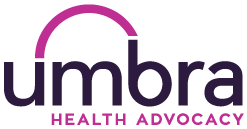How To Make Sure Your Voice Is Heard In Healthcare

In healthcare encounters, too often patients don't feel heard. But to get what you need from the healthcare system, you must be able to use your voice. When your voice is heard in healthcare, you're more likely to feel good about the care you're getting. Most importantly, you're more likely to get the care you need.
There are so many reasons you may not feel your voice is heard when it comes to your healthcare encounters. Doctors are often rushed and may not have time time to really listen to their patients. You may not be sure what you want to say, especially if you're scare or confused about what's going on with your health. Speaking up to authority figures such as doctors or other healthcare providers might be uncomfortable. You may even have been taught not to speak up in a setting like that.
That's where a professional health advocate comes in.
How professional advocates can help make sure your voice is heard
When you hire an independent health or patient advocate or care manager, they work for you. That's the beauty of having your own advocate. Their first and only priority is that you get what you need for your healthcare.
Part of an advocate's role is to make sure your voice is heard.
Professional advocates, like the members of the Alliance of Professional Health Advocates, get it. They know that your wishes matter. They are committed to understanding your preferences, your concerns, and your priorities.
From foundational things such as what you want them to call you to your feelings about major healthcare decisions, it's essential that you speak up. Share your preferences with your advocate.
Make sure they understand your preferences such as what name you'd like to be called or how you prefer to refer to your disease (Do you want to be labeled as "a diabetic" or a "person with diabetes"?
Using your voice goes much farther than that. You should speak up in all aspects of your life when you have a preference.
Speak up!
Why is speaking up so important? For one thing, it can help relieve your stress. Especially during times of medical problems, the less stress the better.
Making your personal preferences known can be a great way to solidify any relationship, whether its with your advocate, or your doctor, or your spouse, or anyone else in your life.
Expressing your preferences may feel difficult or uncomfortable, but it doesn't need to be. You don't have to come across as cranky or b*tchy when you raise the subject of preferences. It's possible to be serious about your preferences, but in a less-than-serious way.
If it were me, I might use some of these lines:
"John, I know you like to call me by my first name, and while I appreciate that you feel close enough to do that, I would truly prefer you call me Mrs. Evans. Or you may call me Her Majesty the Queen!"
or
"Darlene, I realize you grew up in a household where your mom called everyone "Honey". But it's uncomfortable for me and I would prefer you try not to use it. Maybe just substitute my name instead of Honey"
or
"Doctor Jones, when you label me as disabled, it makes it sound as if there's something wrong with me. Granted, I can't get around like I used to, but I still have many great abilities. So would you refer to me instead as a patient with a disability? Or "differently abled? Or even just call me Murgatroyd."
(Don't worry. Dr. Jones will still provide the care you need. Your care will not be any less because you spoke up!)
In many parts of society, respect among individuals seems to have eroded. In healthcare, especially, we need respect for all parties.

It's time for all of us to command the respect we deserve, including you! Speak up to your advocate and all the other people involved in helping you get the most out of your life. Because if you don't tell them, who will?
Or, as my Gramma used to say, "You be Frank, and I'll be Earnest."
- A Rose by Any Other Name Might Ruin a Client Relationship
- How to Handle Unwelcome, Overly Familiar Communication
- SHE Has a Name and Deserves Respect
Find a Health / Patient Advocate or Navigator
Learn more about The Alliance of Professional Health Advocates
